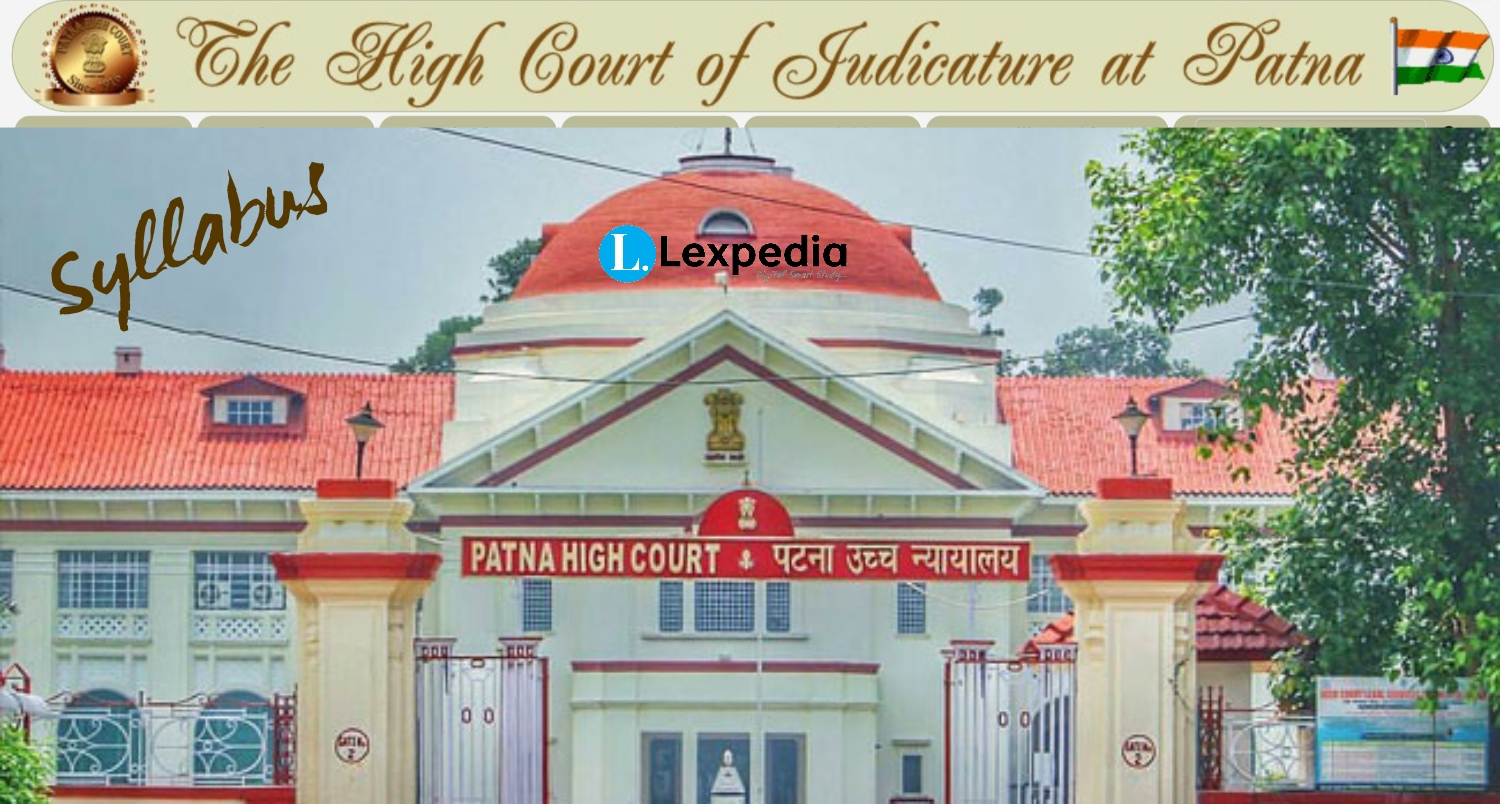Syllabus


preliminary examination shall be an objective type examination consisting of the following 2 papers:
- General knowledge – 100 Marks
- Law - ------------------150 Marks
- 2 hours duration for Each Paper
- 1 mark for each correct Answer
- 250 marks in total (Both Pre. Examination)
- There is no deduction for any unanswered question.
Age Limit:- 22 to 35 yrs. on the date mentioned in the official advertisement. [5 yrs. Relaxation For SC/ST – refer the latest Official advertisement for more details]
NOTE: Only 5 attempts for Unreserved Category
Note: The examination in both papers shall be held on the same day.
PRELIMINARY EXAMINATION SYLLABUS
Paper – 1: GENERAL KNOWLEDGE ——- (100 Marks – 2 Hr.)
1. Current Affairs
2. History
3. Constitution
4. Political System
5. Geography
6. current events of national and international importance.
7. Panchayati Raj.
8. Public Policy.
9. Right Issues.
10. Economic and Social Developments
11. General Science
12. Indian Polity and Governance.
Paper 2:. LAW ———————– (150 Marks – 2 Hr.)
1. Law of Evidence and procedure.
2. Hindu law and Mohammadan Law
3. Principles Of Equity.
4. Constitutional and Administrative Law of India.
5. Law of Trust and Specific Relief.
6. Law of Contracts and Torts
7. Commercial Law
8. Law of Transfer of Property.
Syllabus of Paper 2 – Law is same as provided for mains.
MAINS EXAMINATION
The main examination of the Bihar Judiciary consists of 5 compulsory and 3 optional papers. The written test will consist of descriptive questions for a total of 1050 Marks.
5 COMPULSORY SUBJECTS
PAPER 1:- GENERAL KNOWLEDGE [150 marks.]
1. Current Affairs/Current Events
2. History of India and Bihar.
3. Culture of India and Bihar.
4. Geography of India and Bihar.
PAPER 2:- Elementary GENERAL SCIENCE [100 marks]
1. Everyday Science
2. Elementary general Science
PAPER 3: GENERAL HINDI [100 marks]
1. Essay
2. Make Sentences
3. Grammar
PAPER 4: GENERAL ENGLISH [100 marks]
1. General understanding of the language.
2. Written English.
3. Unseen Passage writing.
4. Precis Writing.
5. Letter Writing.
PAPER 5: LAW OF EVIDENCE AND PROCEDURE. [150 marks]
1. Indian Evidence Act ( 1 of 1872)
2. Arbitration and Conciliation Act. 1996
3. Civil Procedure Code ( 5 of 1908)
4. Code of Criminal Procedure 1973 ( 2 of 1974)
5. Provincial small cause Courts Act, 1887
PAPER 5: LAW OF EVIDENCE AND PROCEDURE. [150 marks]
1. Indian Evidence Act ( 1 of 1872)
2. Arbitration and Conciliation Act. 1996
3. Civil Procedure Code ( 5 of 1908)
4. Code of Criminal Procedure 1973 ( 2 of 1974)
5. Provincial small cause Courts Act, 1887
Note: For Hindi and English papers minimum 30 marks are required to pass the exam. And the marks of Hindi and English papers are not added for the merit list purpose.
OPTIONAL SUBJECTS
Note: Out of the five subjects listed below, the candidate has to select any 3 subjects.
1. Constitutional and Administrative Law of India.
2. Hindu Law and Mohammadan Law.
3. Transfer of Property, Principle of Equity, Law of Trust, and Specific Relief Act.
4. Law of Tort Contracts and Torts.
5. Commercial Law.
PAPER 1. CONSTITUTIONAL AND ADMINISTRATIVE LAW OF INDIA. [150 marks]
1. Constitution of India- Art. 1 – 395 and Schedules
2. Administrative law of India
3. Delegated legislation.
4. Control of Delegated Legislation- Judicial and legislative.
5. Fair hearing- Rules of Natural Justice; Rules against bias, Audi Alteram Partem.
6. Tribunals and Quasi- Judicial Authorities. judicial Control Over them
7. Regulatory Authorities.
8. Judicial Review of Administrative Action.
9. Writ Jurisdiction and Statutory Judicial Remedies, Scope, Extent and Distinction.
10. Public Interest Litigation.
11. Tortious liability of the State and compensation.
12. Promissory Estoppel, Legitimate expectation, and doctrine of Proportionality.
13. Government Contracts.
14. Ombudsman.
PAPER 2: HINDU LAW AND MOHAMMEDAN LAW. [150 marks]
HINDU LAW;
1. Sources & Various branches (School)
2. Marriage
3. Paternity
4. Adoption
5. Joint family and Joint Property
6. Impartible Estate
7. Debt
8. Transfer
9. Division
10. Succession
11. Female wealth
12. Widow’s estate
13. Will
14. Donation
15. Religious and Endowments
MOHAMMEDAN LAW:
1. Sources of Muslim Law, origin and development of various branches
2. The extent of the application of law in India
3. Sharia Act. (1937)
4. The Effect of Converting to Islam
5. Succession and Administration
6. Will
7. Hewa, Hebabil Abaj
8. Waqf- maintenance, legitimacy, acknowledgment, guardianship.
PAPER 3: LAW OF TRANSFER OF PROPERTY AND PRINCIPLES OF EQUITY. [150 marks]
- The property transfer law- act no. 4 of 1882 (Transfer of property act):
- The Principle of Equity also includes the Law of Trust and Specific relief.
1. History of Courts of Equity, maxims, the origin of use in practice Development of Trust.
2. Definition of Justice, Formality in trust formation. Classification of Justice, Express,
Employed, Resulting. Constructive, Private, and Public benami Transactions.
3. Principles of Advancement. Khairati Trust. rights and Duties Of Trustees to Devotar.
Remedies of Breach of Trust.
4. Specific Relief Act, 1963 ( No-47, 1963), Specific Relief Act, 1963 ( Act 147 of 1963)
Indian Trust Act(2 Of 1882)
1. Law of Contracts.
2. Law of Torts.
3. Indian Contract Act.
4. General Principles of Liabilities, Remedies, Nuisance
5. Injuries to persons
6. Assault
7. false Imprisonment
8. Injuries to domestic and contractual relations
9. wrongful Dismissal
10. Defamation
11. negligence
12. The Rule of Ryland V. Fletcher Deceit
13. Conspiracy
14. Malicious Prosecution
1. Sales of Goods
2. Negotiable Instrument Act
3. Company Law
4. Partnership
INTERVIEW
The interview will carry 100 Marks. (35% minimum marks required to Qualify).
- Personality Test, Academic knowledge, Communication skills etc.
- Minimum of 35% marks are required to qualify the interview and make it to the list.





